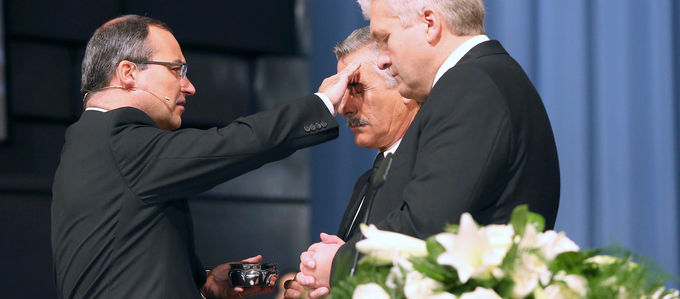
Let each celebrate Communion in their own way? The leap over the church fence is still rather difficult, but there is substantial common ground. This is outlined by the words of consecration and explained by the Catechism of the New Apostolic Church.
“‘Eat and drink! Do this in remembrance of Me.’ For as often as you eat this bread and drink this wine, you proclaim the Lord’s death till He comes.” So ends the New Apostolic consecration formula. And it is there that we can already identify four dimensions of the celebration of Holy Communion as described by the New Apostolic Catechism (CNAC 8.2.8 to 8.2.11).
“Eat and drink”: a meal of fellowship
Holy Communion is a meal of fellowship. Jesus happily and often dined with His Apostles. In the face of His impending death He felt the fervent desire to do so again. Theologically, the Bible develops this fellowship in three ways:
- fellowship with God. Christ mentions the blood of the new covenant. This is a reference to the fact that the old covenant of Sinai was replaced by His sacrificial death on the cross.
- fellowship within the church. Paul asks, “The bread which we break, is it not the communion of the body of Christ?’” The body of Christ is an image for the congregation of the believers.
- the fellowship of mankind. Paul frequently mentions the term synérchomai (coming together) when he reproaches the Corinthians for their carelessness. For him this is not merely an outward gathering, but an internal act of coming together.
“…in remembrance of Me”: a meal of commemoration
Holy Communion is a meal of remembrance. Theologians refer to this statement of Jesus Christ—“Do this in remembrance of Me.”—as the commandment of repetition (or of remembrance). These words are only found in two of the four biblical accounts. Yet they are the reason we talk about the establishment—or institution—of Holy Communion today.
This remembrance applies first and foremost to the death of Jesus Christ “as a unique event which is valid for all times,” as formulated in CNAC 8.2.8. However, this constant repetition is “not only a matter of remembrance directed toward the past, but rather also a reminder of the certainty of Christ’s current presence and His future kingdom.”
“…you proclaim”: a meal of profession
Holy Communion is a meal of profession. After all, “proclaiming” (katangello) is not a silent, inwardly focused form of remembrance, but rather a loud announcement. And this does not happen in the past, but rather at every repetition in the here and now.
Photo: fotomek – stock.adobe.com
Even though this formulation only mentions the death of the Lord specifically, it also refers to our profession of Christ’s ascension and return. After all, CNAC 8.2.9 emphasises that the profession of all three of these together constitutes “part of the fundamental profession of the Christian faith”.
“…till He comes”: a meal of hope
Holy Communion is an eschatological meal. According to CNAC 8.2.11, the eschatological character of this sacrament is closely associated with the marriage feast in heaven. This is because Jesus stated that He will refrain from partaking of the “fruit of the vine” until that point in time that the kingdom of God appears in perfection.
This means that the congregation assembled for Holy Communion lives in hope of entering into perfect fellowship with Christ at His return. Until then, the congregation experiences its most intimate fellowship with the Lord in the Lord’s Supper.














